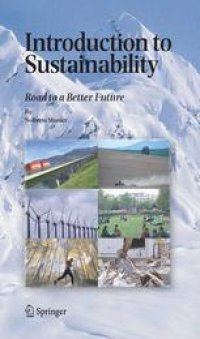
Ebook: Introduction to Sustainability: Road to a Better Future
Author: Nolberto Munier (auth.)
- Tags: Environmental Management, Ecotoxicology, Waste Water Technology / Water Pollution Control / Water Management / Aquatic Pollution
- Year: 2005
- Publisher: Springer Netherlands
- Edition: 1
- Language: English
- pdf
Sustainability is an elusive concept and many have tried to define the idea of what it is. This book relies on the classical interpretation from the Brundtland report, "Sustainable development is development that meets the needs of the present without compromising the ability of future generations to meet their own needs", but rather than trying to frame the concept, it develops a supporting structure, following a natural set of steps to reach an established goal. This book provides the tools to navigate this Road to a Better Future by explaining concepts, giving ideas, proposing methods, and suggesting actions. To illustrate the utilization of techniques there are many examples, applied to a variety of activities, and to wrap up concepts, the last chapter is dedicated to the analysis of a community in search of a sustainable environment. A thematic index has been designed to help a person quickly find information on relevant topics.
Consequently, this book follows a very practical approach, illustrating many different real life paradigms, thus clarifying the use of sustainable resources, including such novel applications as energy from fuel cells and extracting energy from the sea. It also comments on sixteen actual case studies that comprise different activities, including energy generation from wastes, novel transportation schemes, industrial integration, selection of urban indicators, water reuse, energy from renewable energy sources, etc., and touches on people’s participation in the decision-making process.
Each chapter concludes with a comprehensive list of Internet references. Most of these references include comments on their content to facilitate further searching on related topics of interest.
Audience: This book will help decision makers, stakeholders, politicians, students and the public in general to blend the use of sustainability concepts, tools and ideas with their current projects, in order to best attain a sustainable environment.
Sustainability is an elusive concept and many have tried to define the idea of what it is. This book relies on the classical interpretation from the Brundtland report, "Sustainable development is development that meets the needs of the present without compromising the ability of future generations to meet their own needs", but rather than trying to frame the concept, it develops a supporting structure, following a natural set of steps to reach an established goal. This book provides the tools to navigate this Road to a Better Future by explaining concepts, giving ideas, proposing methods, and suggesting actions. To illustrate the utilization of techniques there are many examples, applied to a variety of activities, and to wrap up concepts, the last chapter is dedicated to the analysis of a community in search of a sustainable environment. A thematic index has been designed to help a person quickly find information on relevant topics.
Consequently, this book follows a very practical approach, illustrating many different real life paradigms, thus clarifying the use of sustainable resources, including such novel applications as energy from fuel cells and extracting energy from the sea. It also comments on sixteen actual case studies that comprise different activities, including energy generation from wastes, novel transportation schemes, industrial integration, selection of urban indicators, water reuse, energy from renewable energy sources, etc., and touches on people’s participation in the decision-making process.
Each chapter concludes with a comprehensive list of Internet references. Most of these references include comments on their content to facilitate further searching on related topics of interest.
Audience: This book will help decision makers, stakeholders, politicians, students and the public in general to blend the use of sustainability concepts, tools and ideas with their current projects, in order to best attain a sustainable environment.